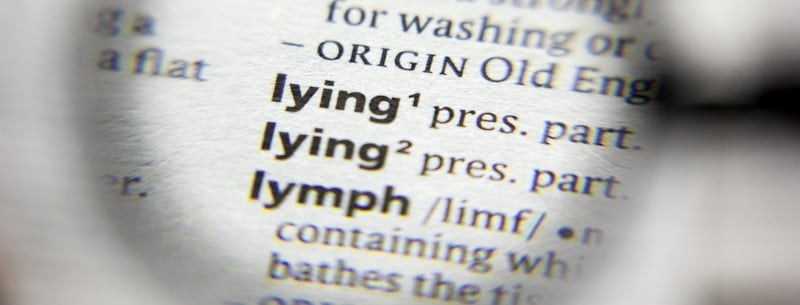Is it “lieing” or “lying”? It may be very strenuous when spelling these words, given that the English language has so many rules and minor intricacies. It is a very commonly misspelled word, and the answer to our question is within the term “lie.”
The correct spelling of this term is lying. “Lieing” is not accepted in the English language. In fact, it is not an accurate word. The reason for this is found in the way we use the term. If we look at the word “lying,” we will see that it has multiple meanings and uses.
We are quickly reminded that many words may seem most logical to integrate into our everyday writing when looking at these terms. Yet, we come across some difficulties when it comes down to getting the spelling just right. So let’s take a look at this word’s meaning, structure, usage, and ways we can accommodate it into our writing bank.

Definition
“Lying” has multiple definitions, and its use will depend on the intent of the writer.
- Lying (noun): the telling of lies. Untruthfulness.
- Lying (adjective): telling or containing lies; being intently untruthful.
- Lying (verb): to be in or to assume a horizontal position.
Grammatical Structure
The word lying can be processed in three different ways. It can appear as a noun, as an adjective, or as a verb. Using the word lying as a noun would mean that you would be giving it an actual name of something. Nouns often appear as the subject of a sentence or as an object in the predicate. So I could say, for example:
- Children diagnosed with Asperger’sAsperger’s syndrome are not very good at lying.
When the word “lying” is used as an adjective, one must never forget that adjectives are words that give information and describe a noun. So, I could say:
- A lying report was delivered to the judge by mistake.
As for “lying” used as a verb, here is where it becomes a bit trickier. The reason for this is that “lying” is the present participle of the verb “lay.” Now, thinking that we mean that someone is actively in a horizontal position, we may say:
- John is lying down because he has a headache.
Etymology
To begin speaking of the origin of the word “lying,” first, we need to understand that the word comes from the base word “Lie,” meaning being untruth with the purpose of deceiving. In the 12th century, the word first appeared from Proto-Germanic “leuganan,” the source also of Old Norse “ljuga,” Danish “lyve, ‘Old Frisian “liaga,” Old Saxon, and Old High German “liogan,” German lügen, Gothic “liugan.” Later, the phrase “lying through one’s teeth” appears in the 1940’s1940’s.
Then we look at Lying (to rest horizontally), also first seen in the early 12th century, from Old English “licgan” (past participle “legen”) meaning “situated in a particular position; be at rest.” from Proto-Germanic “legjan” ( also of Old Norse “liggja,” Old Saxon “liggian,” Old Frisian “lidzia,” Middle Dutch “ligghen,” Dutch “liggen,” Old High German “ligen,” German “liegen,” Gothic ligan “to lie”), from PIE root “legh-” “to lie down, lay.”
Synonyms For Lying
- Misleading
- Falsifying
- Delusive
- Tricky
- False
- Dissembling
- Equivocating
- Misrepresenting
- Wrong
- Scheming
- Two-timing
- Inventing
- Double-crossing
- Prevaricating
- Lay
Antonyms For Lying
- Honest
- Truthful
- Straightforward
- Direct
- Frank
- Sincere
- Genuine
- Open
- Upfront
- Forthright
- Believable
- Factual
- Reliable
- Correct
- Trustworthy
Examples of Lying (untruthful)
- That woman is nothing but a lying cheat. She counted the cards every time it was her turn to go.
- The lying children were sent home to their parents with two weeks of detention to make up for their mistakes.
- Your friend was lying to you when he said he could get you tickets for the concert next week. They were sold out months ago.
- My lying, cheating husband had a girlfriend on the side all this time.
- Lying is one of the worst offenses a person can do. Once a person is caught lying, they never gain back the trust of whom they lied to.
- I was always lying as a child. That’s the reason my parents never trusted me to go to college in another state.
- I once caught my son lying about where he had been, and I punished him for three months. He has never done it again.
- I am lying all the time about the places I work at. I don’t want my girlfriend to know where I am.
- The students were lying about that teacher’s conduct. They meant to get him in trouble, but it did not work.
- My mother always said the worst thing anyone could do to her was cheating and then lying about it.
- The lying snitch tried to incriminate an innocent bystander by blaming him for the robbery.
- The CEO tried to mend the tensions in the company by lying about the last incident report.
- The salesman always brings in the clients by lying about the quality of the products he is selling.
- Lying about products when they are being sold is dishonest and is punishable by the law of false advertisement.
- Con artists are excellent at the art of lying to make you fall for their schemes.
Examples of Lying (To be in a horizontal position)
- The puppy was lying on the bedroom floor when the lady accidentally stepped on his tail.
- The corpse was lying in the middle of the crime scene when the police officer found it.
- The lying woman was startled when her family found her half-asleep in the middle of the day.
- I was lying on the chaise longue reading a good book when it suddenly started to rain.
- The dog, the cat, and the mouse were all lying on the bed comfortably as if they were siblings.
- My children are safely lying in their beds by eight o’clock every night.
- There is nothing I cherish more than lying in bed, sipping on hot cocoa on a cold winter night.
- Everyone was lying in their beds when the earthquake suddenly shook everything and scared everyone out of bed.
- They were all lying on the floor doing their exercises when they were suddenly interrupted by the loud bang of thunder.
- It was Halloween and they were lying on the floor pretending to be asleep when their mother came in and they gave her a scare.
- Camping is so much fun. You get to eat smores and sleep lying in a sleeping bag on the floor.
- The man who had a heart attack was lying on the floor when the paramedics came to take him to the hospital for care.
- I was lying on the sofa when suddenly a flash flood warning hit and my house rapidly filled with water.
- I was exercising; lying on my back doing sit-ups when I heard something snap inside me; I knew something was wrong right away.
- We were quietly lying in bed when the alarm woke us up that morning.
Final Thoughts
There is a vital importance in being aware of our words when we set out to write. “Lieing” and “lying” are clear examples of this because though we may think that it is a simple matter of spelling a word correctly, it can be a quest for understanding the focus of the term we wish to use.
Here we see that the word “lieing” is a misspelled word. However, we also see that although one word may be spelled the same, it can set a definite tone in a conversation. It is always recommended to look at the words we are writing and the context in which we do so. Following these tips will improve your writing style, the technique you use, and the fluency your paper should have to make it attractive to the audience for whom it is directed.
Shawn Manaher is the founder and CEO of The Content Authority. He’s one part content manager, one part writing ninja organizer, and two parts leader of top content creators. You don’t even want to know what he calls pancakes.


